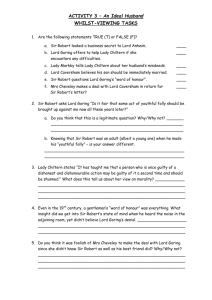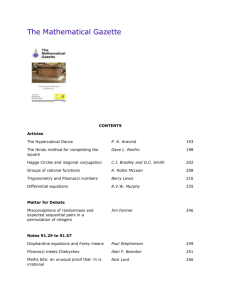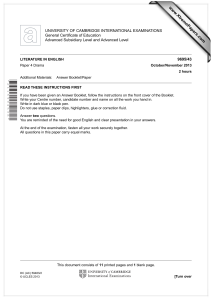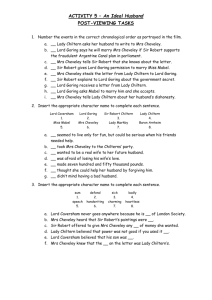www.XtremePapers.com
advertisement
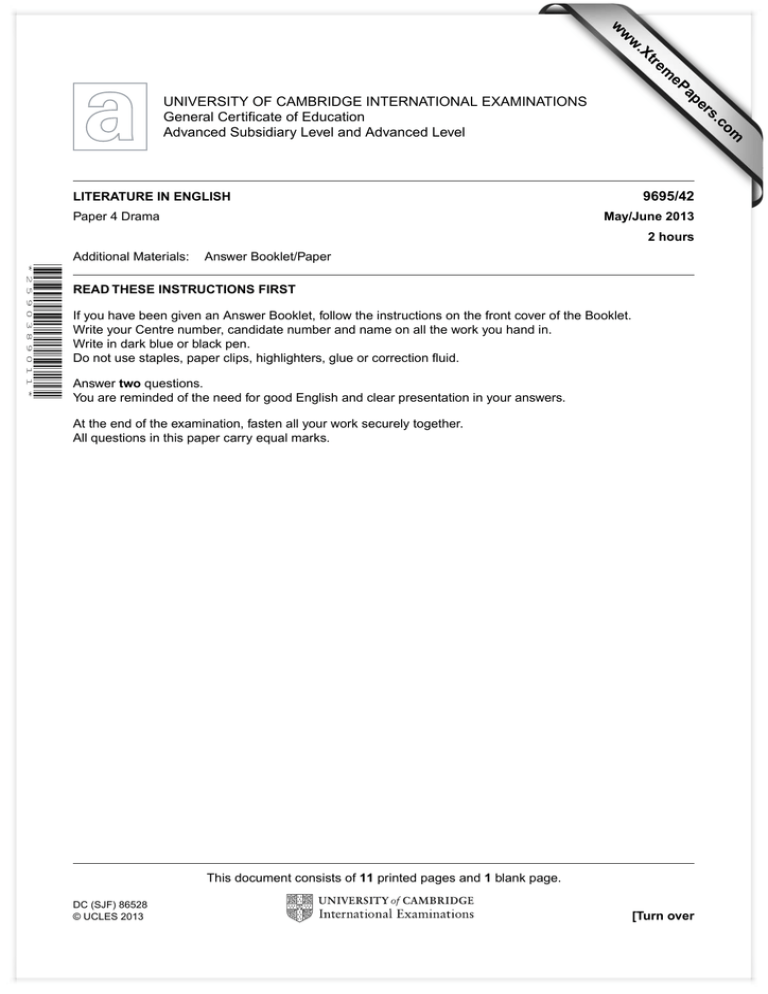
w w ap eP m e tr .X w om .c s er UNIVERSITY OF CAMBRIDGE INTERNATIONAL EXAMINATIONS General Certificate of Education Advanced Subsidiary Level and Advanced Level 9695/42 LITERATURE IN ENGLISH Paper 4 Drama May/June 2013 2 hours Additional Materials: Answer Booklet/Paper * 2 5 9 0 3 8 9 0 1 1 * READ THESE INSTRUCTIONS FIRST If you have been given an Answer Booklet, follow the instructions on the front cover of the Booklet. Write your Centre number, candidate number and name on all the work you hand in. Write in dark blue or black pen. Do not use staples, paper clips, highlighters, glue or correction fluid. Answer two questions. You are reminded of the need for good English and clear presentation in your answers. At the end of the examination, fasten all your work securely together. All questions in this paper carry equal marks. This document consists of 11 printed pages and 1 blank page. DC (SJF) 86528 © UCLES 2013 [Turn over 2 EDWARD ALBEE: Who’s Afraid of Virginia Woolf? 1 Either (a) ‘GEORGE: We all peel labels, sweetie; … you get through the skin, all three layers, through the muscle, slosh aside the organs … and get down to bone.’ What, in your view, is the significance of this remark for the action of the play as a whole? Or (b) With close reference to detail, discuss Albee’s dramatic presentation of Nick and George at this point in the play. WALPURGISNACHT [GEORGE, by himself: NICK re-enters.] Nick [after a silence]: I … guess … she’s all right. [No answer.] She … really shouldn’t drink. [No answer.] She’s … frail. [No answer.] Uh … slim-hipped, as you’d have it. [GEORGE smiles vaguely.] I’m really very sorry. 5 George [quietly ]: Where’s my little yum yum? Where’s Martha? Nick: She’s making coffee … in the kitchen. She … gets sick quite easily. George [preoccupied ]: Martha? Oh no, Martha hasn’t been sick a day in her life, unless you count the time she spends in the rest home…. Nick 10 [he, too, quietly ]: No, no; my wife … my wife gets sick quite easily. Your wife is Martha. George [with some rue]: Oh, yes … I know. Nick [a statement of fact ]: She doesn’t really spend any time in a rest home. 15 George: Your wife? Nick: No. Yours. George: Oh! Mine. [Pause] No, no, she doesn’t … I would; I mean if I were … her … she … I would. But I’m not … and so I don’t. [Pause] I’d like to, though. It gets pretty bouncy around here sometimes. Nick 20 [coolly ]: Yes … I’m sure. George: Well, you saw an example of it. Nick: I try not to … 25 George: Get involved. Um? Isn’t that right? Nick: Yes … that’s right. George: I’d imagine not. Nick: I find it … embarrassing. George [sarcastic]: Oh, you do, hunh? Nick: 30 Yes. Really. Quite. George [mimicking him]: Yes. Really. Quite. [Then aloud, but to himself ] IT’S DISGUSTING! Nick: Now look! I didn’t have anything … George: DISGUSTING! [Quietly, but with great intensity] Do you think I like having that … whatever-it-is … ridiculing me, tearing © UCLES 2013 9695/42/M/J/13 35 3 me down, in front of … [Waves his hand in a gesture of contemptuous dismissal ] YOU? Do you think I care for it? Nick [cold – unfriendly]: Well, no … I don’t imagine you care for it at all. 40 George: Oh you don’t imagine it, hunh? Nick [antagonistic]: No … I don’t. I don’t imagine you do! George [withering]: Your sympathy disarms me … your … your compassion makes me weep! Large, salty, unscientific tears! Nick [with great disdain]: I just don’t see why you feel you have to subject other people to it. 45 George: I? Nick: If you and your … wife … want to go at each other, like a couple of … 50 George: I! Why I want to! Nick: … animals, I don’t see why you don’t do it when there aren’t any … George [laughing through his anger ]: Why, you smug, self-righteous little … Nick 55 [a genuine threat ]: CAN … IT … MISTER! [Silence.] Just … watch it! George: … scientist. Nick: I’ve never hit an older man. George [considers it ]: Oh. [Pause] You just hit younger men … and children … women … birds. [Sees that NICK is not amused.] Well, you’re quite right, of course. It isn’t the prettiest spectacle … seeing a couple of middle-age types hacking away at each other, all red in the face and winded, missing half the time. Nick: 60 65 Oh, you two don’t miss … you two are pretty good. Impressive. George: And impressive things impress you, don’t they? You’re … easily impressed … sort of a … pragmatic idealism. Act 2 © UCLES 2013 9695/42/M/J/13 [Turn over 4 WILLIAM SHAKESPEARE: The Winter’s Tale 2 Either (a) In what ways might it be possible to see Leontes as a ‘tragic figure,’ a flawed victim of his own character and misjudgements? Or (b) With close reference to detail from the passage, discuss Shakespeare’s dramatic presentation of Leontes’s reconciliation with Hermione. Leontes: What you can make her do I am content to look on; what to speak I am content to hear; for ’tis as easy To make her speak as move. Paulina: It is requir’d You do awake your faith. Then all stand still; Or those that think it is unlawful business I am about, let them depart. Leontes: Proceed. No foot shall stir. Paulina: 5 Music, awake her: strike. [Music. ’Tis time; descend; be stone no more; approach; Strike all that look upon with marvel. Come; I’ll fill your grave up. Stir; nay, come away. Bequeath to death your numbness, for from him Dear life redeems you. You perceive she stirs. 10 15 [HERMIONE comes down from the pedestal. Start not; her actions shall be holy as You hear my spell is lawful. Do not shun her Until you see her die again; for then You kill her double. Nay, present your hand. When she was young you woo’d her; now in age Is she become the suitor? Leontes: Polixenes: Camillo: O, She’s warm! If this be magic, let it be an art Lawful as eating. Hermione: © UCLES 2013 25 She embraces him. She hangs about his neck. If she pertain to life, let her speak too. Polixenes: Ay, and make it manifest where she has liv’d, Or how stol’n from the dead. Paulina: 20 That she is living, Were it but told you, should be hooted at Like an old tale; but it appears she lives Though yet she speak not. Mark a little while. Please you to interpose, fair madam. Kneel, And pray your mother’s blessing. Turn, good lady; Our Perdita is found. You gods, look down, And from your sacred vials pour your graces Upon my daughter’s head! Tell me, mine own, Where hast thou been preserv’d? Where liv’d? How found Thy father’s court? For thou shalt hear that I, Knowing by Paulina that the oracle 9695/42/M/J/13 30 35 40 5 Gave hope thou wast in being, have preserv’d Myself to see the issue. Paulina: Leontes: There’s time enough for that, Lest they desire upon this push to trouble Your joys with like relation. Go together, You precious winners all; your exultation Partake to every one. I, an old turtle, Will wing me to some wither’d bough, and there My mate, that’s never to be found again, Lament till I am lost. O peace, Paulina! Thou shouldst a husband take by my consent, As I by thine a wife. This is a match, And made between’s by vows. Thou hast found mine; But how, is to be question’d; for I saw her, As I thought, dead; and have, in vain, said many A prayer upon her grave. I’ll not seek far – For him, I partly know his mind – to find thee An honourable husband. Come, Camillo, And take her by the hand whose worth and honesty Is richly noted, and here justified By us, a pair of kings. Let’s from this place. What! look upon my brother. Both your pardons, That e’er I put between your holy looks My ill suspicion. This your son-in-law, And son unto the King, whom heavens directing, Is troth-plight to your daughter. Good Paulina, Lead us from hence where we may leisurely Each one demand and answer to his part Perform’d in this wide gap of time since first We were dissever’d. Hastily lead away. [Exeunt. 45 50 55 60 65 70 75 Act 5, Scene 3 © UCLES 2013 9695/42/M/J/13 [Turn over 6 WILLIAM SHAKESPEARE: Richard III 3 Either (a) What, in your view, is the effect on an audience of Richard’s soliloquies and ‘aside’ remarks? Or (b) With close reference to language and dramatic action, compare and contrast the presentation of Richard and Richmond in the following scenes. SCENE II. Camp near Tamworth. Enter RICHMOND, OXFORD, SIR JAMES BLUNT, SIR WALTER HERBERT, and Others, with drum and colours. Richmond: Fellows in arms, and my most loving friends, Bruis’d underneath the yoke of tyranny, Thus far into the bowels of the land Have we march’d on without impediment; And here receive we from our father Stanley Lines of fair comfort and encouragement. The wretched, bloody, and usurping boar, That spoil’d your summer fields and fruitful vines, Swills your warm blood like wash, and makes his trough In your embowell’d bosoms – this foul swine Is now even in the centre of this isle, Near to the town of Leicester, as we learn. From Tamworth thither is but one day’s march. In God’s name cheerly on, courageous friends, To reap the harvest of perpetual peace By this one bloody trial of sharp war. Oxford: Every man’s conscience is a thousand men, To fight against this guilty homicide. Herbert: I doubt not but his friends will turn to us. Blunt: He hath no friends but what are friends for fear, Which in his dearest need will fly from him. Richmond: 5 10 15 20 25 All for our vantage. Then in God’s name march. True hope is swift and flies with swallow’s wings; Kings it makes gods, and meaner creatures kings. [Exeunt. SCENE III. Bosworth Field 30 Enter KING RICHARD in arms, with NORFOLK, RATCLIFF, the EARL OF SURREY, and Others. King Richard: Here pitch our tent, even here in Bosworth field. My Lord of Surrey, why look you so sad? Surrey: My heart is ten times lighter than my looks. 35 King Richard: My Lord of Norfolk! Norfolk: Here, most gracious liege. King Richard: Norfolk, we must have knocks; ha! must we not? Norfolk: We must both give and take, my loving lord. King Richard: Up with my tent! Here will I lie to-night; © UCLES 2013 9695/42/M/J/13 40 7 [Soldiers begin to set up the King’s tent. But where to-morrow? Well, all’s one for that. Who hath descried the number of the traitors? Norfolk: Six or seven thousand is their utmost power. King Richard: Why, our battalia trebles that account; Besides, the King’s name is a tower of strength, Which they upon the adverse faction want. Up with the tent! Come, noble gentlemen, Let us survey the vantage of the ground. Call for some men of sound direction. Let’s lack no discipline, make no delay; For, lords, to-morrow is a busy day. [Exeunt. Enter, on the other side of the Field, RICHMOND, SIR WILLIAM BRANDON, OXFORD, DORSET, and Others. Some pitch Richmond’s tent. Richmond: Blunt: The weary sun hath made a golden set, And by the bright tract of his fiery car Gives token of a goodly day to-morrow. Sir William Brandon, you shall bear my standard. Give me some ink and paper in my tent. I’ll draw the form and model of our battle, Limit each leader to his several charge, And part in just proportion our small power. My Lord of Oxford – you, Sir William Brandon – And you, Sir Walter Herbert – stay with me. The Earl of Pembroke keeps his regiment; Good Captain Blunt, bear my good night to him, And by the second hour in the morning Desire the Earl to see me in my tent. Yet one thing more, good Captain, do for me – Where is Lord Stanley quarter’d, do you know? Unless I have mista’en his colours much – Which well I am assur’d I have not done – His regiment lies half a mile at least South from the mighty power of the King. Richmond: If without peril it be possible, Sweet Blunt, make some good means to speak with him And give him from me this most needful note. Blunt: Upon my life, my lord, I’ll undertake it; And so, God give you quiet rest to-night! Richmond: Good night, good Captain Blunt. Come, gentlemen, Let us consult upon to-morrow’s business. In to my tent; the dew is raw and cold. [They withdraw into the tent. 45 50 55 60 65 70 75 80 85 Act 5, Scenes 2 and 3 © UCLES 2013 9695/42/M/J/13 [Turn over 8 TENNESSEE WILLIAMS: A Streetcar Named Desire 4 Either (a) Discuss the role and dramatic significance of Stella in the play as a whole. Or (b) With close reference to the action and language of the passage, including the stage directions, examine how Williams shapes your response to the following scene. [The bathroom door is thrown open and STANLEY comes out in the brilliant silk pyjamas. He grins at her as he knots Content removed due to copyright restrictions. © UCLES 2013 9695/42/M/J/13 9 Content removed due to copyright restrictions. picks up her inert figure and carries her to the bed. The hot trumpet and drums from the Four Deuces sound loudly.] Scene 10 © UCLES 2013 9695/42/M/J/13 [Turn over 10 OSCAR WILDE: An Ideal Husband 5 Either (a) How, and with what effects, does Wilde’s presentation of Mrs Cheveley contrast with that of Lady Chiltern? Or (b) With close reference to detail from the passage, discuss Wilde’s presentation of clashing values and expectations at this point in the play. © UCLES 2013 Lord Goring: You want to talk to me about Mrs Cheveley? Lady Chiltern: Yes. You have guessed it. After you left last night I found out that what she had said was really true. Of course I made Robert write her a letter at once, withdrawing his promise. Lord Goring: So he gave me to understand. Lady Chiltern: To have kept it would have been the first stain on a career that has been stainless always. Robert must be above reproach. He is not like other men. He cannot afford to do what other men do. [She looks at LORD GORING, who remains silent ] Don’t you agree with me? You are Robert’s greatest friend. You are our greatest friend, Lord Goring. No one, except myself, knows Robert better than you do. He has no secrets from me, and I don’t think he has any from you. Lord Goring: He certainly has no secrets from me. At least I don’t think so. Lady Chiltern: Then am I not right in my estimate of him? I know I am right. But speak to me frankly. Lord Goring [Looking straight at her ]: Quite frankly? Lady Chiltern: Surely. You have nothing to conceal, have you? Lord Goring: Nothing. But, my dear Lady Chiltern, I think, if you will allow me to say so, that in practical life – Lady Chiltern [Smiling]: Of which you know so little, Lord Goring – Lord Goring: Of which I know nothing by experience, though I know something by observation. I think that in practical life there is something about success, actual success, that is a little unscrupulous, something about ambition that is unscrupulous always. Once a man has set his heart and soul on getting to a certain point, if he has to climb the crag, he climbs the crag; if he has to walk in the mire – Lady Chiltern: Well? Lord Goring: He walks in the mire. Of course I am only talking generally about life. Lady Chiltern [Gravely]: I hope so. Why do you look at me so strangely, Lord Goring? Lord Goring: Lady Chiltern, I have sometimes thought that … perhaps you are a little hard in some of your views on life. I think that … often you don’t make sufficient allowances. In every nature there are elements of 9695/42/M/J/13 5 10 15 20 25 30 35 40 11 weakness, or worse than weakness. Supposing, for instance, that – that any public man, my father, or Lord Merton, or Robert, say, had, years ago, written some foolish letter to some one … Lady Chiltern: What do you mean by a foolish letter? Lord Goring: A letter gravely compromising one’s position. I am only putting an imaginary case. Lady Chiltern: Robert is as incapable of doing a foolish thing as he is of doing a wrong thing. Lord Goring [After a long pause]: Nobody is incapable of doing a foolish thing. Nobody is incapable of doing a wrong thing. Lady Chiltern: Are you a Pessimist? What will the other dandies say? They will all have to go into mourning. Lord Goring [Rising]: No, Lady Chiltern, I am not a Pessimist. Indeed I am not sure that I quite know what Pessimism really means. All I do know is that life cannot be understood without much charity, cannot be lived without much charity. It is love, and not German philosophy, that is the true explanation of this world, whatever may be the explanation of the next. And if you are ever in trouble, Lady Chiltern, trust me absolutely, and I will help you in every way I can. If you ever want me, come to me for my assistance, and you shall have it. Come at once to me. Lady Chiltern Lord Goring [Looking at him in surprise]: Lord Goring, you are talking quite seriously. I don’t think I ever heard you talk seriously before. [Laughing]: You must excuse me, Lady Chiltern. It won’t occur again, if I can help it. Act 2 © UCLES 2013 9695/42/M/J/13 45 50 55 60 65 70 12 BLANK PAGE Copyright Acknowledgements: Question 1 Question 4 © Edward Albee; Who’s Afraid of Virginia Woolf; Published by Vintage. Reprinted by permission of the Random House Group Ltd; 2001. A Streetcar Named Desire by Tennessee Williams. Copyright © 1947 by The University of The South. Reprinted by permission of Georges Borchardt, Inc. for the Estate of Tennessee Williams. Permission to reproduce items where third-party owned material protected by copyright is included has been sought and cleared where possible. Every reasonable effort has been made by the publisher (UCLES) to trace copyright holders, but if any items requiring clearance have unwittingly been included, the publisher will be pleased to make amends at the earliest possible opportunity. University of Cambridge International Examinations is part of the Cambridge Assessment Group. Cambridge Assessment is the brand name of University of Cambridge Local Examinations Syndicate (UCLES), which is itself a department of the University of Cambridge. © UCLES 2013 9695/42/M/J/13
